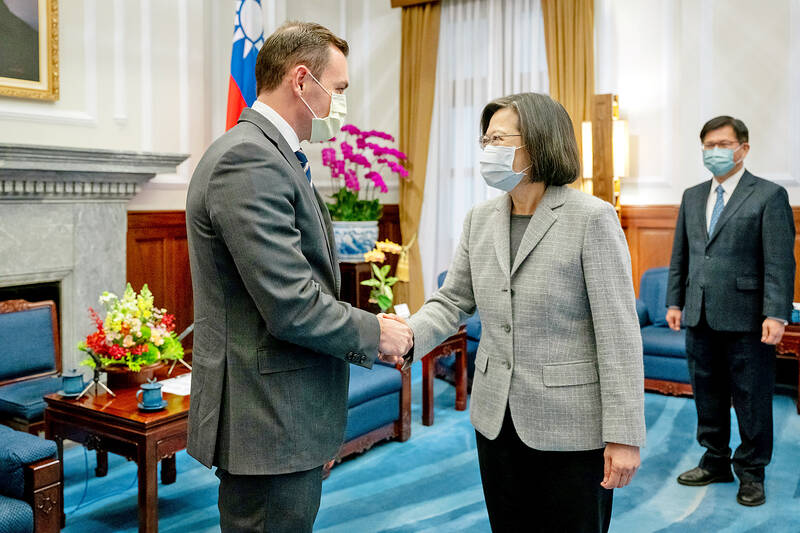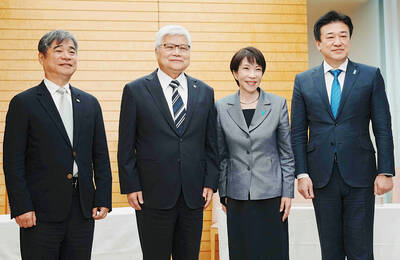The US House of Representatives select committee on China is to hold its first hearing on Tuesday next week, focusing on human rights abuses in China and how to protect Taiwan, CNN reported yesterday.
The news came after US Representative Mike Gallagher, who chairs the committee, on Monday returned from a four-day visit to Taiwan.
The hearing would be attended by high-profile figures involved in the US’ rivalry with China, such as former US national security adviser H.R. McMaster and former US deputy national security adviser Matthew Pottinger, CNN cited sources familiar with the hearing as saying.

Photo courtesy of the US House Select Committee on Strategic Competition Between the Us and the Chinese Communist Party
The hearing would also be attended by Tong Yi (童屹), a former secretary to Chinese dissident Wei Jingsheng (魏京生), and Alliance for American Manufacturing president Scott Paul, the news channel reported.
The committee is planning to focus on the Chinese government’s human rights abuses and how the US can help protect Taiwan against increasing hostility from China, it said.
The committee members are to talk about the threats posed by China to help the committee identify priorities in dealing with Beijing’s provocation, it said.
The committee would also focus on finding ways to address challenges posed by China concerning its role in the semiconductor supply chain, CNN said.
US Representative Ro Khanna, who visited Taiwan with a delegation from Sunday to Thursday, told CNN that he hopes top officials such as CIA Director Bill Burns would discuss strategies to avoid a conflict with China with the committee, it said.
Gallagher told Fox News yesterday that the US is “not moving fast enough to learn and implement the lessons from Ukraine. Foremost among them is the need to arm our friends and partners before it’s too late,” referring to a backlog of military sales to Taiwan.
After meeting with President Tsai Ing-wen (蔡英文) in Taiwan, he realized the necessity of countering China’s “cognitive warfare,” including online attacks and disinformation that are meant to undermine democracy in Taiwan and around the world, he said in a statement on Wednesday.
The most powerful weapon against cognitive warfare is the truth, he said, adding that the committee is dedicated to revealing Beijing’s aggression toward the US and other allies, and seeking strong bipartisan support to take action against China’s threats and to safeguard the interests of the US.
Additional reporting by CNA

Right-wing political scientist Laura Fernandez on Sunday won Costa Rica’s presidential election by a landslide, after promising to crack down on rising violence linked to the cocaine trade. Fernandez’s nearest rival, economist Alvaro Ramos, conceded defeat as results showed the ruling party far exceeding the threshold of 40 percent needed to avoid a runoff. With 94 percent of polling stations counted, the political heir of outgoing Costa Rican President Rodrigo Chaves had captured 48.3 percent of the vote compared with Ramos’ 33.4 percent, the Supreme Electoral Tribunal said. As soon as the first results were announced, members of Fernandez’s Sovereign People’s Party

EMERGING FIELDS: The Chinese president said that the two countries would explore cooperation in green technology, the digital economy and artificial intelligence Chinese President Xi Jinping (習近平) yesterday called for an “equal and orderly multipolar world” in the face of “unilateral bullying,” in an apparent jab at the US. Xi was speaking during talks in Beijing with Uruguayan President Yamandu Orsi, the first South American leader to visit China since US special forces captured then-Venezuelan president Nicolas Maduro last month — an operation that Beijing condemned as a violation of sovereignty. Orsi follows a slew of leaders to have visited China seeking to boost ties with the world’s second-largest economy to hedge against US President Donald Trump’s increasingly unpredictable administration. “The international situation is fraught

Taiwan Semiconductor Manufacturing Co (TSMC, 台積電) plans to make advanced 3-nanometer chips in Japan, stepping up its semiconductor manufacturing roadmap in the country in a triumph for Japanese Prime Minister Sanae Takaichi’s technology ambitions. TSMC is to adopt cutting-edge technology for its second wafer fab in Kumamoto, company chairman C.C. Wei (魏哲家) said yesterday. That is an upgrade from an original blueprint to produce 7-nanometer chips by late next year, people familiar with the matter said. TSMC began mass production at its first plant in Japan’s Kumamoto in late 2024. Its second fab, which is still under construction, was originally focused on

GROWING AMBITIONS: The scale and tempo of the operations show that the Strait has become the core theater for China to expand its security interests, the report said Chinese military aircraft incursions around Taiwan have surged nearly 15-fold over the past five years, according to a report released yesterday by the Democratic Progressive Party’s (DPP) Department of China Affairs. Sorties in the Taiwan Strait were previously irregular, totaling 380 in 2020, but have since evolved into routine operations, the report showed. “This demonstrates that the Taiwan Strait has become both the starting point and testing ground for Beijing’s expansionist ambitions,” it said. Driven by military expansionism, China is systematically pursuing actions aimed at altering the regional “status quo,” the department said, adding that Taiwan represents the most critical link in China’s